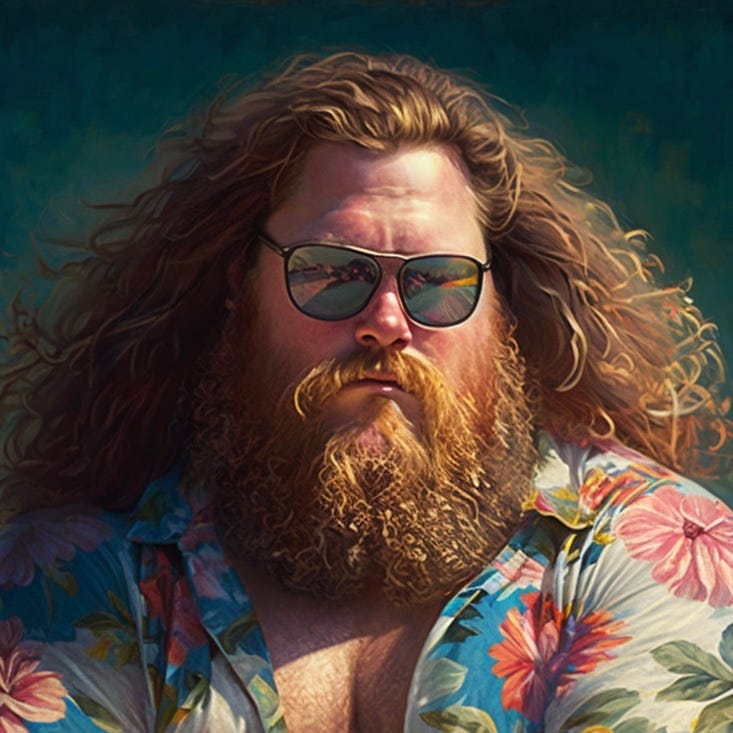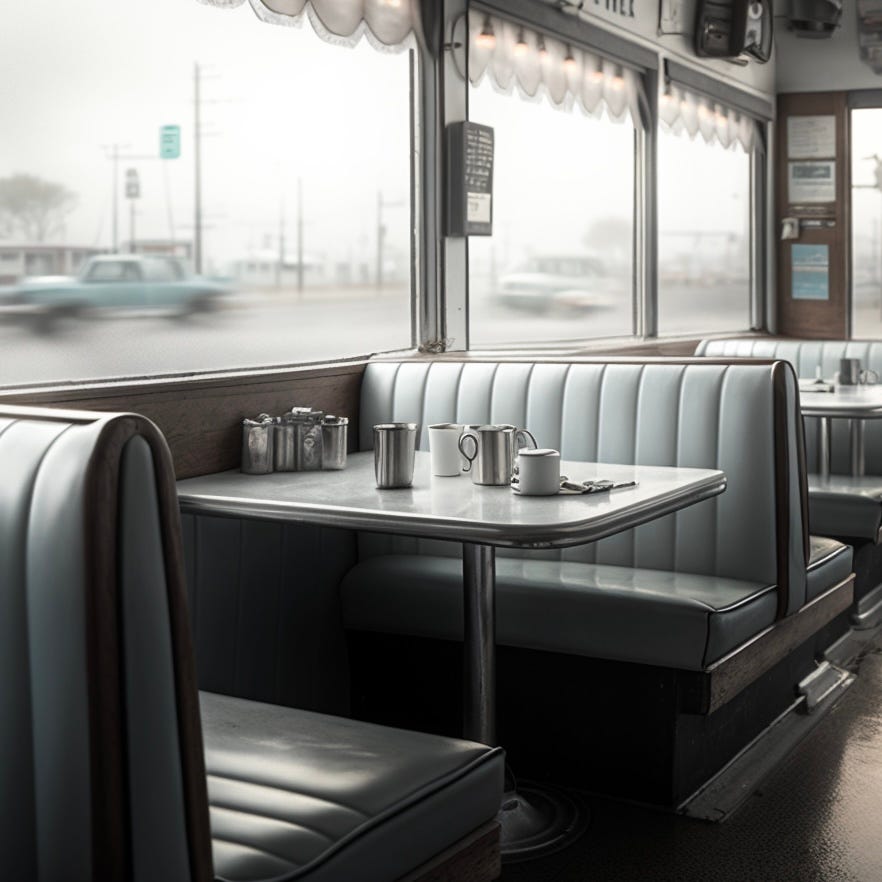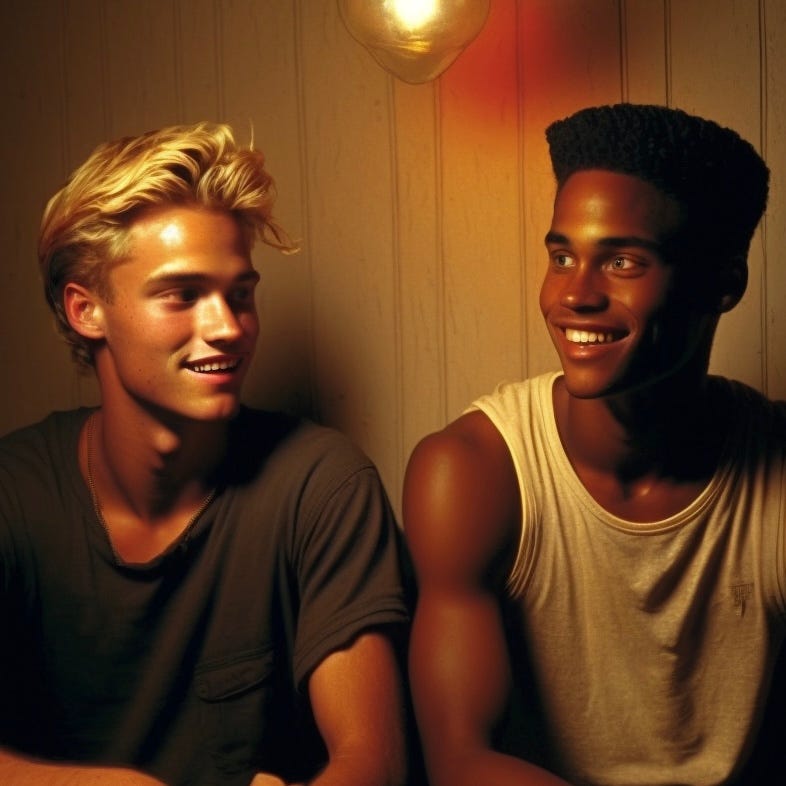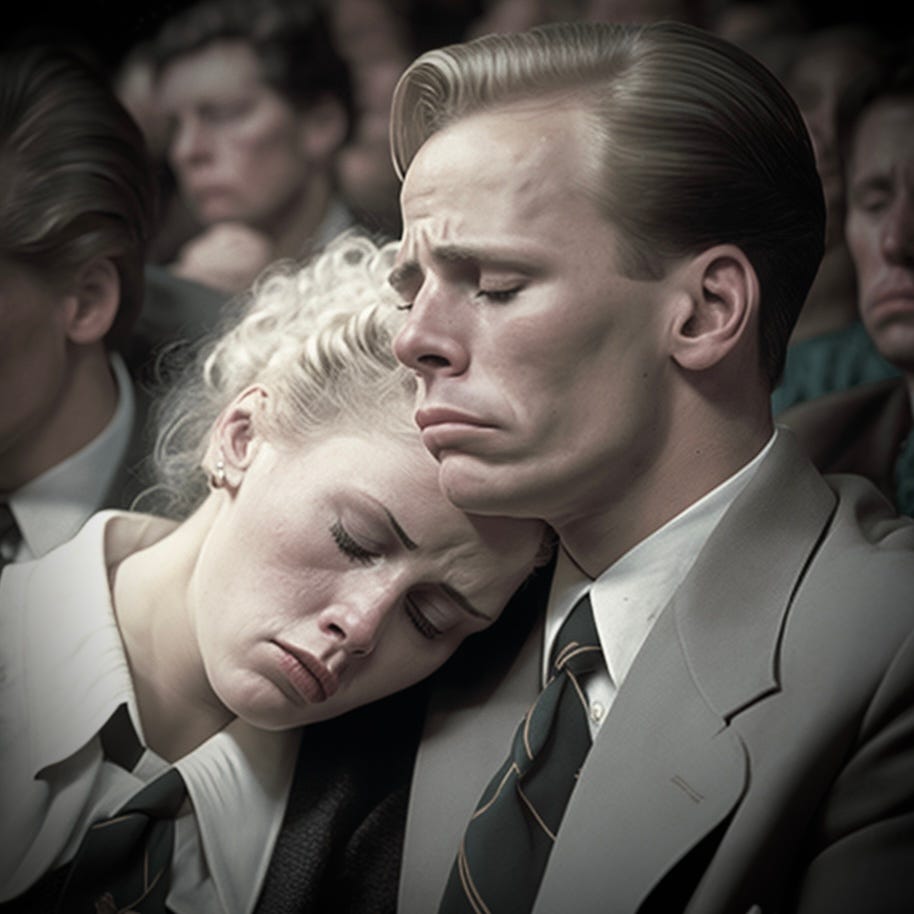If you’re joining us just now, follow the snake’s tail to the Prologue or climb a ladder to the Table of Contents.
Chapter 3: Making the World a Better Place
Evan knew with certainty that the inert singularity had pointed (with a human index finger) in that direction. So he stepped forward and was on an escalator going up. The yellow stripes on either side of the corrugated step he stood on ran parallel to the yellow stripes on the up-rising steps. His right hand rested on the rubber guardrail. He was ascending a misty opalescent plenitude backlit by a wall of bright white light. In every direction he looked, there were other escalators, but not all of these moved as linearly as the one he was on. Some twisted in on themselves. And in between them floated the sleek bodies of giant snakes. The snakes coiled around the escalators or were entwined with one another.
The massive head of one of these serpents turned its deathless eyes toward Evan. Its tongue darted out and licked his hand. But then it turned its head away, disinterested. A husky man with long auburn hair and a full beard came sliding down one of the snakes. He slowed as he approached Evan’s escalator.
“Hey pal!” he cried out.
“Gordon!” Evan replied. “I’m on my way to see you!”
“I know! Crazy stuff, isn’t it?”
“Yeah,” Evan said. “This is why I never dropped acid. I’m not sure how my brain would react to something like this.”
Gordon waved goodbye and continued down the serpent’s tail.
Evan hadn’t yet met Gordon on the planet Earth (where the sun rises in the west), but the singularity was explaining to him how the two of them would become friends. Gordon grew vegetables out of some illegal garden plots outside of LA. The land was owned by mega businesses that hadn’t yet decided what to do with the property they owned. In some cases the land had been left unattended to for nearly a decade.
Gordon sold his merchandise out of a flower-power van along Ventura Highway. Evan met Gordon for the first time in August after graduating from UCLA. He had started his job at Caltech, and met Niyati on his first day of work. (That alone was a strange story.) Evan and Niyati started dating and a month later they decided to go on their first road trip together to Lake Shasta. As they were driving out of town, Niyati asked Evan to stop at the vegetable stand.
Gordon was so chatty and interesting. He told them that he had memorized the entirety of the Bhagavad Gita in an English translation he kept in the van. Evan didn’t know what the Bhagavad Gita was, but Niyati did. She asked Gordon to please recite some of it. That was all the invitation he needed. The big guy literally had the whole thing by heart and started declaiming it from the beginning. Evan didn’t usually go in for poetry, but there was something about the way Gordon spoke—like a shaman—that Evan found captivating. They listened for nearly three hours as the traffic sped by. No other cars stopped. Gordon took breaks to drink some water, and he gave Evan and Niyati a couple of cucumbers gratis, which Niyati cut up into slices and shared with Evan. They didn’t regret their decision to cancel the weekend trip to Lake Shasta.
“Things like this happen for a reason,” Niyati told Evan.
As the sun sank in the east, Gordon went to his van and fetched some pillows and blankets. The three of them walked a hundred yards east—away from the highway and built a fire in a fire pit that someone else had used. They slept out under the stars. And when Evan woke up the next morning, he saw Niyati and Gordon by the van, sitting across from each other in the lotus position. Gordon was teaching Niyati transcendental meditation as the Saturday morning traffic headed north along Ventura Highway against the backdrop of the rising sun. Or maybe she was teaching it to him.
—Now a voice told Evan in an Australian accent to “mind” his step instead of “watching” it. He looked down and was surprised to see that the escalator step that he had been standing on was going down rather than up. The singularity was explaining to Evan that the so-called three dimensions were not particularly relevant on the Astral Plane. “In fact,” the singularity added. “they can be a bit distracting. Try watching where you’re going with your mind instead of your eyes.”
“Okay,” Evan said. “But I’m kinda confused because now I’m sitting at a very real table in a very real diner with a very real window to my right and it’s raining outside.” To clinch his argument, Evan looked down at the (very real) napkin holder next to the (very real) sugar dispenser with its (very real) square-shaped stainless-steel flap covering the nozzle. He had a hunch that he didn’t need to tell the singularity what he was looking at and the singularity confirmed this by saying, “We’re pair-bonded, so I can see everything you’re seeing.”
That’s about as invasive as a rectal exam, Evan thought. Then he casually asked, “Did you hear what I just thought?”
“Yes.”
“Duuude… So if the three dimensions aren’t real, why am I seeing three-dimensional stuff?”
“I said that the three dimensions weren’t particularly relevant on the Astral Plane, not that they didn’t exist.”
Evan heard canned laughter, because he was in America’s favorite sitcom and the main characters always gathered at the diner at the beginning of the show to bitch about their lives and say mean things about their friends and family, and the viewers loved it.
Niyati sat in the booth across from Evan. On that first day that they met at Caltech, he asked her if she wanted to go to lunch with him. They went to the retro diner across the street, which was where they were sitting now. And for some reason, the anonymous observers of the sitcom were amused because they laughed again.
Gordon sat next to Niyati and the table somehow wasn’t riding up against his gut. Evan turned to his left and saw that Levi was in the booth next to him. Levi was the only one at the table who didn’t have a cup of coffee in front of him. The canned laughter found this hilarious—as did Evan—but Niyati and Gordon didn’t laugh, because it was as if the anonymous viewers were mocking Levi because he was different, and Gordon told the canned laughter to shut the fuck up.
“Why are you here?” Evan asked Levi. He didn’t ask it rudely. He was just puzzled, because Levi was just the Mormon guy he shared an apartment with off the UCLA campus.Levi reached across the table and took Gordon’s spoon. Then he began stirring the coffee in Evan’s mug.
“Oh… I remember now,” Evan said as he peered down into its swirling depths.
Last year, Levi was brewing coffee in Evan’s coffee-maker. Levi had never made coffee before, so he was winging it. He wasn’t sure how many scoops he was supposed to put in the filter. So he put seven in and then removed one because it looked like too much. When the coffee-maker beeped, Levi filled a porcelain mug and carried it into Evan’s room. He would not have dared to go into Evan’s room if the door had been closed, but it had been open since last night—the night he got hammered.
Evan had told the crew, “I’m callin’ it a night. I think I’m gonna throw up.”
Everyone rose.
“Not now” he said, “but probably later. I better sleep on the floor so I don’t blow chunks on the mattress.”
Marcus put some sheets down on the floor next to Evan’s bed and threw the bed pillows on the floor too. Levi saw the guests out of the apartment. Then he went to the kitchen. He removed a stainless-steel mixing bowl from the cupboard and went back to Evan’s room and put it on the floor next to his head in case he had to vomit.
“Thanks,” Evan said and fell asleep almost immediately.
Then Levi sat down on the carpet with his back against the wall of Evan’s room and tried to sleep himself. But whenever Evan stirred or became agitated, Levi woke up and went to him. He helped him puke into the stainless-steel bowl. Then, as quickly as he could, he took the bowl into the bathroom, dumped the vomit into the toilet, flushed it, went to the kitchen, rinsed it out, and returned to Evan’s room.
Twice Evan started breathing stertorously and Levi shook him awake to make sure he wasn’t choking. He helped him roll over onto his side, so that he could breathe more easily.
“Evan,” Levi said the next morning, holding the steaming mug of coffee in his hand.
“What?” Evan said, opening his eyes, weakly.
“I made you coffee.”
Evan sat up, accepted the mug, and took a sip.
“Dude,” he said. “This is the worst coffee I’ve ever had in my life. Didn’t you work at the breakfast bar in the student union?”
“Yeah,” Levi grinned. “But I just made the pastries and worked the cash register.”
“Well, you prolly shouldn’t run a café,” Evan said. Then he wiped his hands through his hair. “I thought I was gonna get sick last night.”
“You were sick,” Levi said innocently. “You threw up.”
Evan jumped up and looked at the bed.
“It’s okay,” Levi told him. “You didn’t get anything on the bed. You slept on the floor. You vomited in your mom’s mixing bowl.”
“Gross,” Evan said. “Did you clean that up?—I’m so sorry. . . If it happens again, I’ll clean it up.”
“It’s okay,” Levi said. And then he took a deep breath because he wanted to make sure what he was about to say sounded friendly and not judgmental: “You play pretty rough, Evan. I’d sure hate to lose my friend. The world’s a better place with you in it.”
—On that summer day in 1979, Niyati had told Evan, “There’s another meaning for the word ‘minister’. It’s someone who gives people advice.”
—“Jesus,” Evan said, turning away from Levi and heading to the bathroom. “Sometimes you’re annoying. I’m gonna take a shower.”
Levi took the coffee mug out of Evan’s hands and walked out of the room. He was relieved that Evan had only been annoyed, but hadn’t snapped at him. It meant they were still friends. As Levi washed the mug, he thought of Evan’s kindness during the midterms.
Evan had been to the store with Marcus and the two of them entered the apartment and saw Levi freaking out.
“What’s wrong?!” Evan asked.
“The professor said we have to turn in our papers by email! They’re due in an hour! But the computer labs on campus are all full! I’ve been dinkin’ around with this flippin’ computer trying to get it to work!”
Marcus and Evan started laughing.
“Dinkin?” Marcus said. “I’ve never heard that word in my life.”
“Bro,” Evan said, “you need to stop worrying about stuff like that. You’re gonna have a stroke.”
Immediately, Levi grew calm. Evan had never shown so much consideration for his well being.
“Lemme take a look,” Marcus said. He was a computer science major and quickly diagnosed the problem.
“Do you guys have another phone jack?” Marcus asked.
“Yeah,” Evan said, “there’s one behind that bookshelf.”
“Okay,” Marcus said. “Let’s move it out of the way.”
“I got it,” Evan said and lifted the bookshelf by himself.
Marcus plugged the modem into the other outlet, went back to the computer, connected to the ISP, and used his own credentials to log into the university network.
“There you go, Levi,” Marcus said. “I got your flippin’ computer to work so you don’t have to dink around with it anymore.”
“Thanks, Marcus!” Levi said, beaming. This was one of the greatest moments in Levi’s life. Marcus and Evan had teamed up to help him, because they saw he was upset.
—Now Niyati was stirring the coffee in Evan’s mug in that misty sitcom diner on the Astral Plane.
“Take a look now,” Niyati said, and Evan peered into the auburn-black clouds.
It was the Friday before the Christmas break. Evan was sitting in his favorite leather-covered bean bag chair. The polystyrene stuffing crinkled under his weight. He wore his boxer briefs and nothing else. He’d taken a shower before the guys showed up. He liked the feeling of the leather clinging to his skin. The lava-lamp on the table beside Marcus and Levi washed the room in an auburn-black glow, the color of prophecy.
There was something about the moment that Evan found significant. Terrie had handed him the bong, so he took a hit.—And it was then that he had said that Destiny was as real as the bong he was holding, and he’d thought it sounded clever and deep, and his friends seemed to find it clever and deep too. But the canned laughter laughed and Levi sipped his milk. Evan hadn’t noticed Levi was there (even though he’d been sitting next to Marcus for hours). And the reason for this was that Evan didn’t really like Levi all that much; and if he thought of him at all, it was only as that weirdo Mormon guy he roomed with.
—Niyati told Evan that it was time to see that night through Levi’s eyes. And as she spoke Evan’s own eyes swam with tears.
Evan had never known how much it had meant to Levi to take part in these gatherings, listening to the vulgar stories and jokes that Evan and his friends told. True, Levi would often have to step outside and breathe the fresh air, because the smell of the cannabis was so nauseating to him, and, combined with the reek of the alcohol, he often felt woozy. Levi knew that Evan and his friends were breaking the law. And this guilty knowledge made him cry at night.
“Heavenly Father,” he would pray, “please forgive me and Evan—and Evan’s friends. I know what they’re doing is wrong, but I’ve never had people treat me the way they do. They like me, even though I’m different. And I always ask you for advice and counsel, but you never respond to me. But they do.”
When the party was over that night, Marcus was the last to leave. Levi showed him to the door and returned to the auburn-black den. Evan was passed out on the bean bag chair. Levi stared at his friend in wonder and awe. Evan’s head was tilted back at an angle so that he looked like a biblical warrior-king—or like Christ in Michelangelo’s Pietà. Levi stood over Evan for a full minute. He bent down and nudged his roommate’s shoulder to wake him. The warmth of Evan’s shoulder made Levi’s throat tighten and his mouth went dry. He felt that thing again—a thing he had no name for. And he was so afraid to tell Evan about it, because he knew that if he did, he’d lose his best friend forever.
Evan’s eyes fluttered open and he sat up. “What’s wrong?” he asked.
“Everyone’s gone.”
Evan wiped his bloodshot eyes. “What time is it?”
“About three in the morning.”
“Why aren’t you asleep?”
“I’m about to turn in.”
“Why did you wake me up? I could’ve slept here.”
“I thought you’d want to sleep in your bed.”
“Were you watching me?”
“No,” Levi said.
Evan rose from the bean bag chair and headed to his room. “Sometimes you creep me out,” he said. He shut the door, and Levi heard him lock it.
Evan graduated from UCLA at the end of the spring term. He moved out of the apartment the week after graduation. Levi returned to Utah, where he lived with his parents while looking for work.
One day, Levi asked his mom and dad if he could talk to them in the dining room. He’d never been so nervous in his entire life. They sat across from him at the table. Before he knew what he was doing, he was talking, rambling, telling them about that thing (because he had to tell someone), and he kept hedging his comments with absurdities and second-guessing everything he had just said. And then he wondered aloud if maybe he shouldn’t have told them about it at all.
Levi’s mother cried and shook her head. His father, the accountant, said, “You’re as screwed up as Hogan’s goat. . . I don’t know where you picked up these foolish ideas—probably that school in California. But I’m gonna get you into a meeting with the bishop, and you can talk to him.”
Levi’s parents rose from the table and went upstairs. Levi sat alone for about an hour. Then he decided to go on a hike to clear the air. He rode his bicycle from West Jordan to Sandy, and chained his bike to the fence at the trailhead of Bells Canyon Falls. He hiked up the foothills and passed some teenagers on their way back down. They told him it was starting to get dark, since the sun was already dropping behind the Wasatch Mountains in the east.
Levi continued up the trail until he reached the lower falls. The sound of the plunging water was so calming. But he was alone with his thoughts—and this always made him sad, because Levi hated the limitations of language, and it seemed to him that the words he chose to pin to the thoughts he had were always misinterpreted by others—like that thing he felt around Evan. He had no words in his private lexicon for it.
“Sometimes you creep me out,” Evan had said. Levi sat on a rock by the ledge of the overlook and prayed to Heavenly Father to show him a way forward, because he couldn’t understand why he had felt that thing and why his mannerisms had bothered his best friend so much that he had said that to him. Levi’s prayer went unanswered, and so he rose from the rock and went to the overlook’s edge.
And at his funeral, Levi’s mother and father would be inconsolable, and his father would press his fist to his chest and tell Levi’s mother that, if he could only go back to that moment when Levi had told them about that thing, he would’ve said that, even though he didn’t understand it, he would try to because he couldn’t imagine their lives without him.
And the mourners at the funeral would comfort Levi’s parents by saying that Bells Canyon Falls was a dangerous trail to hike alone at night, and that Levi must have lost his footing. But all Levi’s father would be able to think of was that time long ago when his baby boy cried out “Daddy! Watch!” and leapt from the mountain ledge into a shimmering Wasatch lake on that marigold-yellow summer afternoon as the child Niyati said “Moksha!” and removed the black playing piece from the Snakes and Ladders game board on the deck of Evan’s backyard in Pasadena, California, in 1979.
Evan saw all this in the auburn-black depths of the coffee mug. And he felt ashamed. He would never know what happened to Levi after graduation. But years later, while working at that warehouse in Oregon, the subject of Mormonism would come up in the breakroom. And Evan would tell his coworkers that, when he was in college back in the Nineties, he had a Mormon roommate—nice guy, but a bit weird.
“His name was Levi, but I can’t remember his last name. He told me once that some members of the LDS Church consider the word ‘Mormon’ offensive. So I told him I was sorry for all the times I called him that. But Levi told me that he didn’t mind when I called him a Mormon—”
“Because we’re friends,” Levi said to Evan in that sitcom diner on the Astral Plane.
Evan put his arms around Levi and said, “I’m so sorry, buddy.”
Evan had never called Levi “buddy” before. He’d called him “bro” and “dude”, but never “buddy”. A look of infinite gratitude overspread Levi’s countenance, as he whispered into his best friend’s ear, “The world’s a better place with you in it.”















Gets me every time. 😢